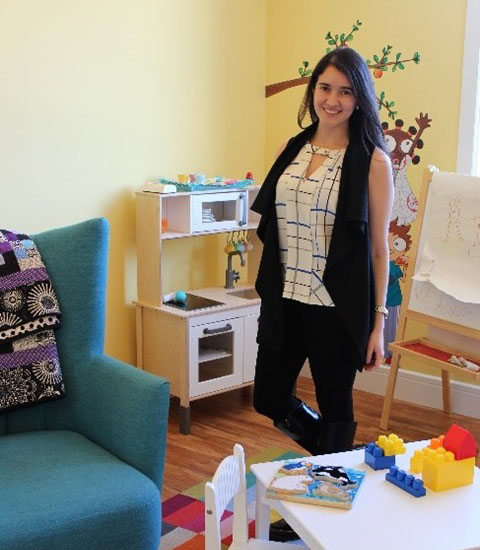
Written by guest blogger Paula A. Ospina.
Everything started in 2014 during my undergraduate studies, when I began my clinical placement in pediatrics at the National Cancer Institute. The excitement of being able to work clinically with children, the challenge of exploiting my creativity to get and keep their attention, and the anxiety of undertaking a very challenging placement turned out to be a mix of emotions. At that time, several thoughts came to mind: ‘what if I become depressed after seeing the kids suffer?’, ‘what if I leave heartbroken every day after work?’, ‘what if this placement is very difficult and I don’t do well?’, ‘what if…’ the list of questions got longer and longer the more I thought about it.
—Without knowing—I started a placement that was one of the best experiences of my life. Every day, I got to meet wonderful children and adolescents with cancer, suffering from severe illnesses and requiring complex treatments, who were very eager to work hard to improve their health. These children were filled with positive energy that transmitted to me. I will always see them as true warriors. I never left the Institute feeling sad or depressed, it was the opposite, I experienced a strong connection with the kids. This is when I realized my initial worries were irrelevant. I was impressed by these children, who, despite their young ages, had a very clear idea of what really matters in life. They were very grateful for each effort I made to make them feel better or to improve their quality of life; which in turn, motivated me to search for the best research evidence to minimize the severity of their side effects from cancer. Coming from the habit of learning evidence-based physical therapy interventions with other populations and conditions—where established protocols are in place—I had the expectation of learning all the physical therapy interventions specific to children and adolescents with cancer. Unfortunately, here was the challenge—or as I call it—my motivation: I did not find evidence I could apply in my treatment plans. The literature at the time was limited to a few case studies and preliminary clinical trials that did not inform us about the best evidence in pediatric oncology rehabilitation. Given the lack of evidence supporting physical therapy interventions in pediatric oncology, the only resource available was to assess our patients in all the applicable categories established by the American Physical Therapy Association (APTA) and design a plan of treatment based on our neurological, musculoskeletal, and cardiorespiratory training, and simply apply the interventions with certain precautions known in cancer patients.
I started noticing that our treatment plans indeed worked and showed positive benefits in the children. So, I asked myself, “Why is there is no research evidence to date if there is a clear benefit of the interventions we provide?” At this point, I realized the urgent need for research in this area. Shortly after, one of my professors approached me and proposed to take part in an international research clinical internship at the University of Alberta. This opportunity seemed perfect for me. I eagerly accepted the opportunity to acquire skills and knowledge in clinical research. I received an invitation for the internship from Dr. Margaret McNeely, an internationally recognized cancer researcher. This could not have been better! I had a wonderful placement with Dr. McNeely, which motivated me to pursue further studies in the area of cancer rehabilitation to help children recover from, and cope with their cancer treatments.
And here I am, still exploring the benefits of physical therapy, and with a long career path ahead of me to advance knowledge in the field. I have completed a master’s degree and I am currently pursuing a doctoral degree, both focused in pediatric oncology rehabilitation.
To date, the decision to take the clinical placement at the National Cancer Institute, and the experience and challenges of this first exposure, changed my life. I plan to eventually go back to the Institute and share my findings with future physical therapy students.
The story will be continued in the next post!
Paula A. Ospina, BScPT, MScis from the Department of Physical Therapy, Faculty of Rehabilitation Medicine, University of Alberta. Read her latest article in Physiotherapy Canada entitled “A Scoping Review of Physical Therapy Interventions for Childhood Cancer” here.
The UTP Journals blog features guest posts from our authors. The opinions expressed in these posts may not necessarily represent those of UTP Journals and their clients.
Comments on this entry are closed.